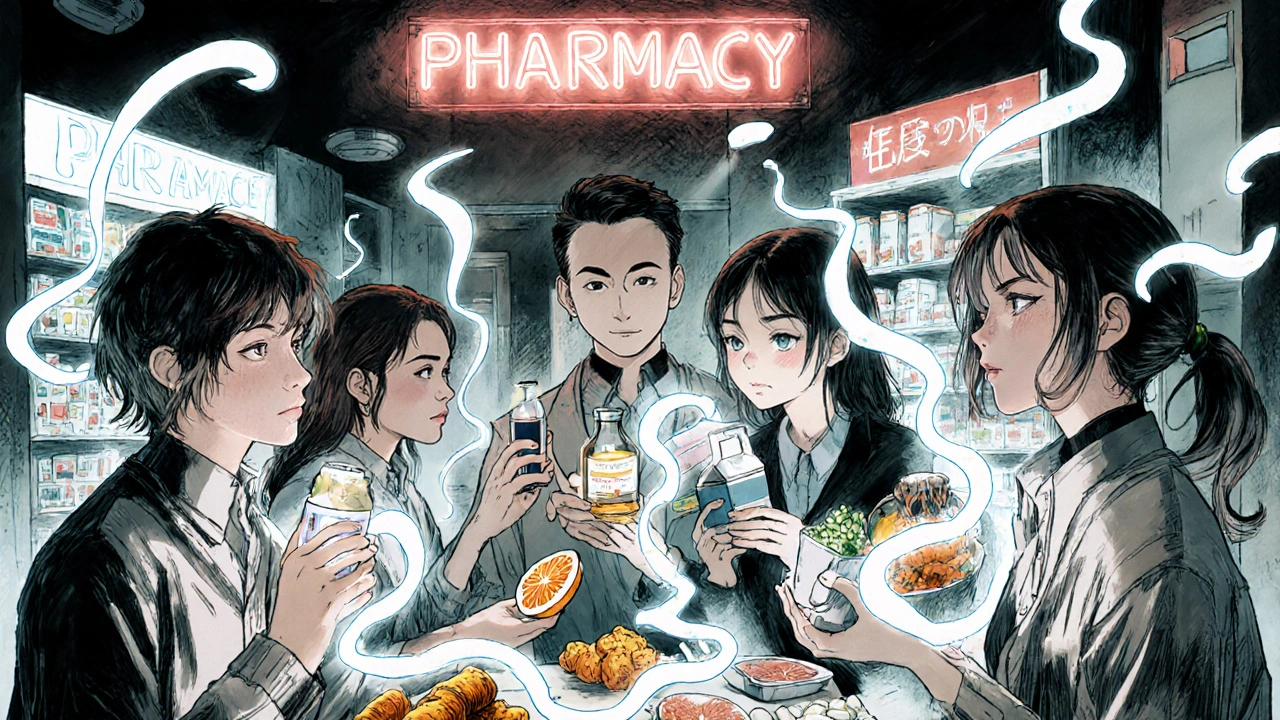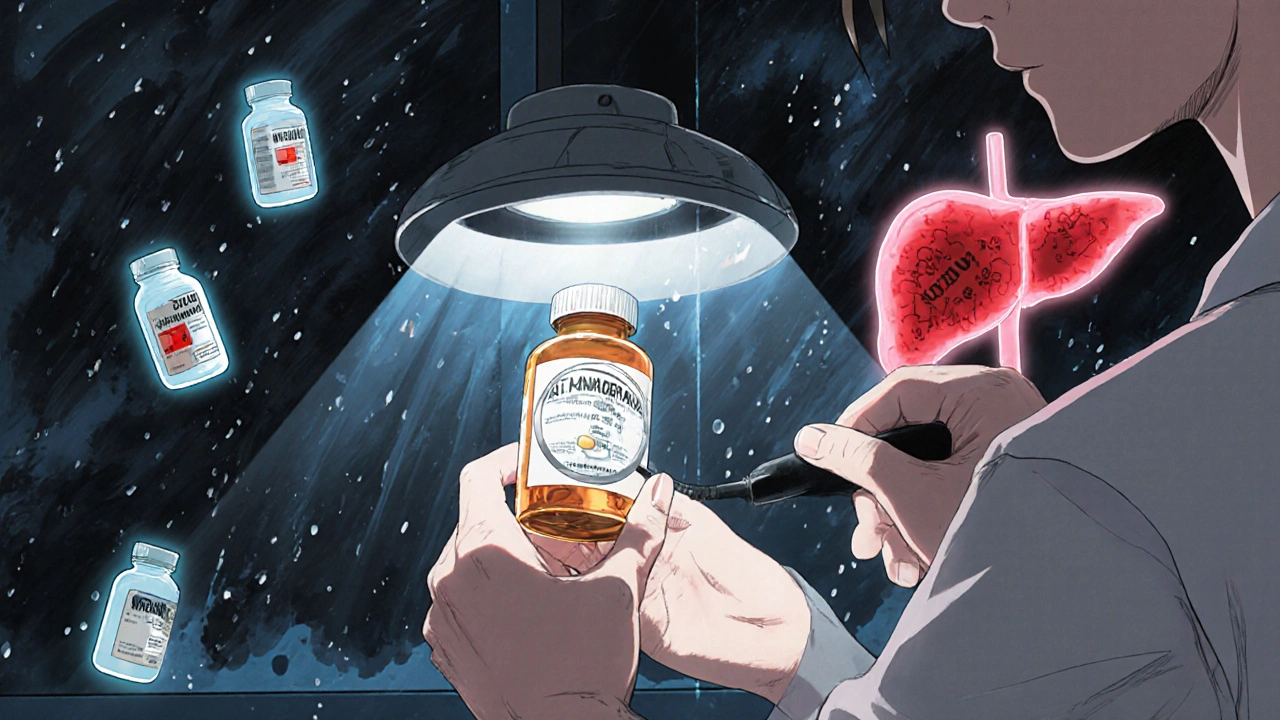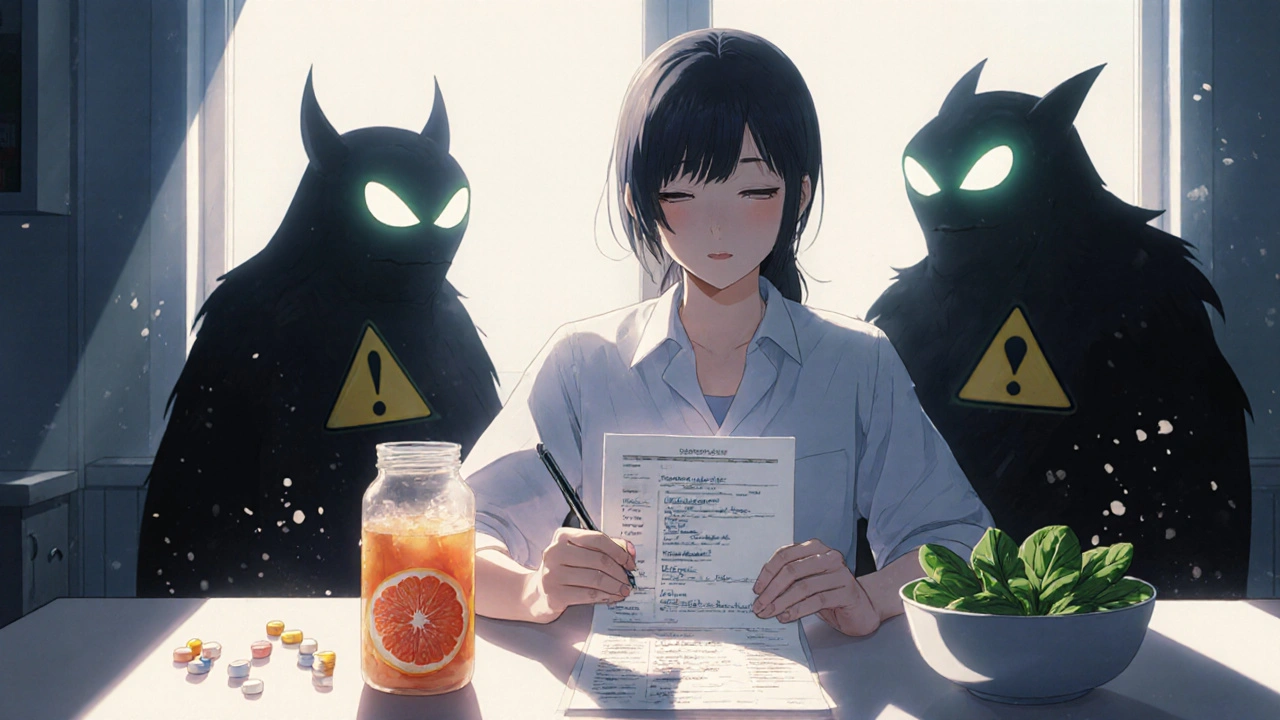How to Discuss Supplements and Food Interactions with Your Pharmacist
 Nov, 13 2025
Nov, 13 2025
Most people know to tell their doctor about their prescription meds. But how many of them mention the turmeric pill they take for joint pain, the fish oil they swallow every morning, or the grapefruit they eat with breakfast? If you’re on any kind of regular medication, skipping this conversation with your pharmacist could be risky. You might think supplements are harmless because they’re sold over the counter. But they’re not harmless when mixed with your pills. And your pharmacist is the one person trained to catch these dangerous combinations before they hurt you.
Why Your Pharmacist Needs to Know Everything You Take
It’s not just about pills. It’s about what you eat, drink, and swallow every day. The American Society of Health-System Pharmacists says up to 25% of people on prescription drugs also take dietary supplements. That’s one in four. And most of them never tell their pharmacist. Why? Because they assume it’s not important. Or they think the pharmacist won’t care. That’s a dangerous assumption.
St. John’s wort, for example, is a popular herbal remedy for low mood. But it can make birth control pills useless. It can stop blood thinners like warfarin from working. And when mixed with antidepressants, it can trigger serotonin syndrome - a life-threatening spike in brain chemicals. Goldenseal? It can mess with how your liver processes over 50 different medications. Even something as simple as dairy can interfere. Calcium in milk or supplements can block absorption of antibiotics like tetracycline or thyroid meds like levothyroxine.
And it’s not just herbs. Your daily habits matter too. Grapefruit juice - even one glass - can turn a standard dose of a cholesterol drug like atorvastatin into a toxic overdose. It affects blood pressure meds, anti-anxiety pills, and even some cancer treatments. Broccoli, kale, spinach? High in vitamin K. If you’re on warfarin, suddenly eating more of these can make your blood clot when it shouldn’t. Your pharmacist doesn’t just look at your pill bottle. They look at your whole life.
What Supplements Are Highest Risk?
Not all supplements are created equal. Some are low risk. Others are ticking time bombs. Here’s what to watch out for:
- St. John’s wort: Interacts with antidepressants, birth control, blood thinners, HIV meds, and transplant drugs. One of the most dangerous.
- Goldenseal: Can alter how your body breaks down many medications, including heart drugs and diabetes pills.
- Ginkgo biloba: Increases bleeding risk when taken with aspirin, ibuprofen, or warfarin.
- Milk thistle: Can interfere with liver-metabolized drugs like statins and some cancer treatments.
- Black cohosh: May affect liver enzymes - risky if you’re on liver-heavy meds.
- Vitamin E and garlic supplements: Can thin the blood. Dangerous before surgery or with anticoagulants.
And here’s the catch: the FDA doesn’t test supplements before they hit the shelf. That means what’s on the label isn’t always what’s inside. A 2025 study found that some herbal products contained hidden pharmaceuticals - like the same active ingredient in prescription Viagra - without being listed. Your pharmacist knows which brands have third-party verification (USP, NSF, ConsumerLab). They can tell you which ones are worth trusting.
What Foods Can Clash With Your Meds?
Food isn’t just fuel. It’s a chemical actor in your body. And some foods play rough with meds.
- Dairy and calcium: Don’t take antibiotics like ciprofloxacin or levothyroxine within 2-4 hours of milk, yogurt, or calcium supplements. The calcium binds to the drug and stops it from working.
- Grapefruit and citrus: Avoid entirely if you’re on simvastatin, atorvastatin, felodipine, or cyclosporine. Even one glass can cause dangerous buildup in your blood.
- Vitamin K-rich foods: Spinach, kale, Brussels sprouts, broccoli. If you’re on warfarin, keep your intake steady. Sudden changes can make your blood too thick or too thin.
- High-sodium foods: If you’re on diuretics or blood pressure meds, too much salt can undo their effect.
- Alcohol: It doesn’t just interact with painkillers. It worsens side effects of antidepressants, antibiotics, and even acid reflux meds like omeprazole.
And here’s something most people miss: some medications drain your body of nutrients. Proton pump inhibitors (like omeprazole) lower vitamin B12 and magnesium. Metformin for diabetes can cause B12 deficiency, leading to nerve damage. Statins reduce coenzyme Q10 - which may explain why so many people on them get muscle pain. Diuretics knock out potassium and magnesium. Oral contraceptives can lower B vitamins and magnesium. If you’re on any of these, your pharmacist should be checking your nutrient levels - not just your pills.

How to Prepare for Your Appointment
Don’t walk in with your head full of vague memories. Bring a written list. Here’s what to include:
- All prescription drugs - name, dose, how often you take them.
- All supplements - brand name, ingredient, dosage, how often you take it. Even the ones you only take “when needed.”
- Over-the-counter meds - like ibuprofen, antacids, or sleep aids.
- Your diet - do you eat grapefruit daily? Drink green smoothies? Take calcium with breakfast? Mention it.
- Any side effects - unusual fatigue, dizziness, stomach upset, bleeding gums. Don’t assume it’s normal.
Write it down. Don’t rely on memory. If you’re unsure what’s in a supplement, bring the bottle. Pharmacists are used to reading labels. They’ll spot hidden ingredients you didn’t know were there.
What to Ask Your Pharmacist
Don’t wait for them to ask. Take charge. Here are five questions you should always ask:
- “Can this supplement interact with any of my medications?” - Don’t say “I take this for energy.” Say “I take 500mg of ashwagandha daily.” Specifics matter.
- “Should I take this with food or away from my other pills?” - Timing is everything. Some need space. Others need fat to absorb.
- “Is there a better time of day to take this?” - Some supplements cause drowsiness. Others boost energy. Timing can make a big difference.
- “Are there any foods I should avoid while taking this?” - Grapefruit, dairy, alcohol - ask specifically.
- “Do you know if this brand is tested by USP or NSF?” - If they don’t know, ask them to check. Quality matters more than price.
And if they say, “That’s fine,” ask again. “Are you sure? I’ve heard it can interact with blood thinners.” Pharmacists are trained to catch these things. If they don’t, it’s not your fault. Push for clarity.

What If You’re Already Taking Something Risky?
If you’ve been taking St. John’s wort with your antidepressant, or grapefruit with your statin - don’t panic. Don’t quit cold turkey. That can be dangerous too.
Call your pharmacist. Say: “I’ve been taking X with Y. I just learned it might be risky. What should I do?” They’ll help you adjust safely. Maybe they’ll suggest switching to a different supplement. Or changing the timing. Or monitoring your blood levels. The goal isn’t to scare you. It’s to keep you safe.
And if you’ve been told to stop a supplement by your doctor - don’t just assume your pharmacist knows. Tell them. They’re your safety net.
Why This Conversation Is More Important Than Ever
The supplement market is worth over $55 billion in the U.S. alone. Over half of American adults take at least one. And that number climbs with age. In the UK, it’s rising too - especially among older people managing multiple conditions.
Here’s the reality: most pharmacists want to help. But they can’t help if you don’t tell them. A 2025 study showed that when pharmacists asked specific questions - “Do you take St. John’s wort?” instead of “Do you take supplements?” - they caught 12 times more dangerous interactions. That’s not luck. That’s training.
By 2027, most community pharmacies in the UK and US will offer structured supplement reviews as part of routine care. But right now, it’s still up to you to start the conversation. Don’t wait for them to ask. Bring your list. Ask your questions. Be specific. Be honest. Your life could depend on it.

Nathan Hsu
November 13, 2025 AT 22:41I can't believe people still think supplements are 'natural' so they're safe-hello? Turmeric is a potent anti-inflammatory, and if you're on blood thinners, you're playing Russian roulette with your arteries.
My uncle in Delhi had a stroke last year because he took ashwagandha with warfarin-he thought 'Ayurveda doesn't hurt.' It did. Hard.
Pharmacists aren't just pill dispensers-they're your last line of defense. If you don't tell them everything, you're basically saying 'I trust my Google search more than my healthcare system.' That's not bravery-it's negligence.
And yes, grapefruit juice? One glass with simvastatin? That's not a 'healthy habit,' that's a pharmacy emergency waiting to happen.
Stop romanticizing herbalism. It's not a yoga pose. It's chemistry. And chemistry doesn't care about your beliefs.
Bring the bottle. Write it down. Say it out loud. Your pharmacist has seen worse. They won't judge. They'll save your life.
I've been doing this for 15 years. I've seen people die because they didn't speak up. Don't be that person.
And no, your 'organic' multivitamin isn't exempt. It's got vitamin K, iron, and who knows what else-unregulated, untested, unlisted.
Stop being embarrassed. Your health isn't a secret club.
My mom took St. John’s wort for 'mild depression' while on her antidepressant. She ended up in the ER with serotonin syndrome. She didn't know. She thought it was 'just a tea.' It wasn't.
So please-just tell your pharmacist. Even if it feels awkward. Even if they seem busy. Even if you think it's 'no big deal.' It is.
And if your pharmacist says 'it's fine'-ask again. Push. Demand clarity. You're worth it.
And yes, I'm that guy who brings a printed spreadsheet to the pharmacy. You should be too.
Ashley Durance
November 14, 2025 AT 00:02Most people don’t realize that 'natural' means unregulated, not safe. The FDA doesn’t approve supplements before sale-that’s not a loophole, it’s a liability.
St. John’s wort isn’t 'herbal therapy,' it’s a CYP3A4 inducer that renders 50+ drugs ineffective. Birth control? Gone. Warfarin? Useless. SSRIs? Dangerous.
And don’t get me started on goldenseal. It inhibits CYP2D6 and CYP3A4-your liver doesn’t know the difference between a pill and a powder. It metabolizes both the same way.
People think their 'clean lifestyle' makes them immune. It doesn’t. It just makes them more dangerous.
Calcium blocking levothyroxine? That’s not a myth. That’s pharmacokinetics 101.
If you’re taking anything beyond a basic vitamin D, you’re already in the risk zone. Stop pretending otherwise.
And no, 'I only take it once a week' doesn’t matter. Cumulative effects don’t care about your schedule.
The fact that people still think this is optional is why we have a healthcare crisis.
Scott Saleska
November 15, 2025 AT 16:50Hey, I just wanted to say-I used to think this was overblown too. Then I started taking metformin and realized I was getting weird numbness in my feet. Turns out, long-term metformin depletes B12. My pharmacist caught it. I was getting a nerve biopsy until they checked my levels.
So now I bring my whole pill organizer every time I go in-even the gummy vitamins I take for 'energy.' They’ve saved me twice already.
And yeah, grapefruit juice? I used to drink it with my statin. Now I don’t. Simple swap. Big difference.
Also, don’t trust 'USP Verified' blindly. I once had a brand that said 'USP' but the label was misprinted. Pharmacist spotted it. I almost didn’t.
Just be honest. They’ve heard it all. I swear.
Ryan Anderson
November 17, 2025 AT 08:02This is so important 😭
I used to think supplements were like vitamins from the 90s-harmless. Then I found out my turmeric pill was messing with my blood pressure med. My pharmacist literally said, 'You’re lucky you didn’t have a stroke.' 🙏
Now I bring my bottle to every visit. Even the one I only take when I feel stressed.
Also-ginkgo biloba? I took it for 'brain fog'-turns out it was making me bleed when I brushed my teeth. 😳
Pharmacists are unsung heroes. Tell them everything. Even the weird stuff.
And yes, I write it on my phone notes. No excuses.
Eleanora Keene
November 18, 2025 AT 04:00You know what? I used to be terrified to talk to my pharmacist. I thought they’d think I was weird for taking ashwagandha and magnesium. But when I finally did-it changed everything.
They told me my magnesium was interfering with my thyroid med. I didn’t even know that was possible.
Now I bring my list every time. I even write down what I ate that day if I think it might matter.
And guess what? They never judge. They’re just glad I showed up.
You’re not being dramatic. You’re being smart.
And if you’re nervous-just say, 'I want to make sure I’m not hurting myself.' They’ll love you for it.
It’s not about being perfect. It’s about being safe.
You’ve got this.
Joe Goodrow
November 18, 2025 AT 15:47Why are we letting foreigners sell snake oil to Americans? This whole supplement thing is a scam. It’s Chinese herbs, Indian powders, and Canadian gummies with no oversight.
My cousin took some 'immune booster' from Amazon. It had hidden sildenafil. He ended up in the hospital. That’s not wellness-that’s fraud.
We need to ban these imports. Regulate like we regulate pills. Or we’re just letting the world poison us.
And don’t tell me 'natural' is better. Natural doesn’t mean safe. Poison ivy is natural.
Stop being gullible. Start being patriotic.
Don Ablett
November 19, 2025 AT 06:29The pharmacokinetic interactions between dietary supplements and pharmaceutical agents are underreported in clinical literature due to the absence of mandatory reporting frameworks for over-the-counter products
It is well documented that CYP450 enzyme modulation by herbal constituents such as hyperforin in St. John’s wort significantly alters plasma concentrations of co-administered drugs
Furthermore, calcium-mediated chelation of tetracycline antibiotics in the gastrointestinal lumen reduces bioavailability by up to 50% according to a 2023 meta-analysis
Regulatory gaps persist due to the Dietary Supplement Health and Education Act of 1994 which precludes pre-market safety evaluation
Therefore, patient-initiated disclosure remains the primary mechanism for mitigating adverse events
Pharmacists are uniquely positioned to intervene given their access to comprehensive medication profiles
However, systemic underutilization of pharmacist consults persists due to patient misconceptions regarding scope of practice
Further research is required to quantify the prevalence of non-disclosure among elderly polypharmacy populations
Kevin Wagner
November 20, 2025 AT 23:55Let me tell you something-your pharmacist is your superhero. Not your doctor. Not your nurse. THEM.
I used to think I was too healthy to need this stuff. Then I started taking CoQ10 for my statin muscle pain. My pharmacist said, 'That’s great-but are you taking it with your statin or 4 hours apart?' I had no idea.
Turns out, if you take them together, the statin doesn’t work. I was wasting money. And my legs were still killing me.
So now I bring my whole life to them. My green smoothies. My late-night chamomile tea. My 'just one' grapefruit.
They don’t roll their eyes. They high-five me. They say, 'You’re doing it right.'
And you know what? That feels better than any supplement ever did.
Stop being shy. Start being smart. You’re not weird-you’re powerful.
Go. Bring the bottle. Say it out loud. You’ve got this.
gent wood
November 22, 2025 AT 08:09I’ve worked in community pharmacy for 22 years, and I can tell you this: the most dangerous patients aren’t the ones taking too much-they’re the ones taking nothing and saying nothing.
One woman came in with a bottle of black cohosh, didn’t mention she was on tamoxifen. We caught it because we asked. She cried. Said she thought it was ‘just for menopause.’
Another man took ginkgo with aspirin-said he ‘read it was good for circulation.’ His INR was 8. He almost bled out.
We don’t judge. We don’t lecture. We just need to know.
So if you’re reading this-please, just tell us.
We’re not here to shame you. We’re here to keep you alive.
And if you’re nervous? Say, 'I’m not sure if this matters.' We’ll figure it out.
It’s not a burden. It’s a partnership.
Dilip Patel
November 23, 2025 AT 01:27u r all overthinking this
my uncle in delhi takes 10 supplements and 6 pills and still runs marathons
you think ur body cant handle it? u r weak
western medicine is all scam anyway
ayurveda knows better
why u trust big pharma but not turmeric?
they want u to be dependent
just take what u want
stop listening to white doctors
u r fine
Jane Johnson
November 24, 2025 AT 02:09Actually, the data on grapefruit interactions is overstated. Only certain CYP3A4 substrates are affected, and many newer statins are not metabolized that way.
Additionally, vitamin K intake variability in warfarin patients is often managed through INR monitoring-not dietary restriction.
Most supplement interactions are theoretical or based on case reports, not clinical trials.
Patients are being unnecessarily frightened.
Pharmacists should focus on evidence-based interventions, not fear-based counseling.
Also, the FDA does regulate supplement manufacturing under GMPs.
And the 'hidden Viagra' study? It was a single lab’s findings, not peer-reviewed replication.
There’s a difference between caution and alarmism.
Sean Hwang
November 24, 2025 AT 21:57Just wanted to say-I started bringing my supplements to the pharmacy last year. I used to feel dumb about it.
Turns out, my magnesium was blocking my blood pressure med. I didn’t even know.
Now I just say, 'Hey, I take this-what do you think?' And they always know.
They even told me to stop taking garlic pills before surgery. Saved me from bleeding too much.
It’s not complicated. Just be honest. They’ve seen it all.
And yeah, I write it on my phone. No spreadsheet needed.
You’re not weird for caring. You’re smart.